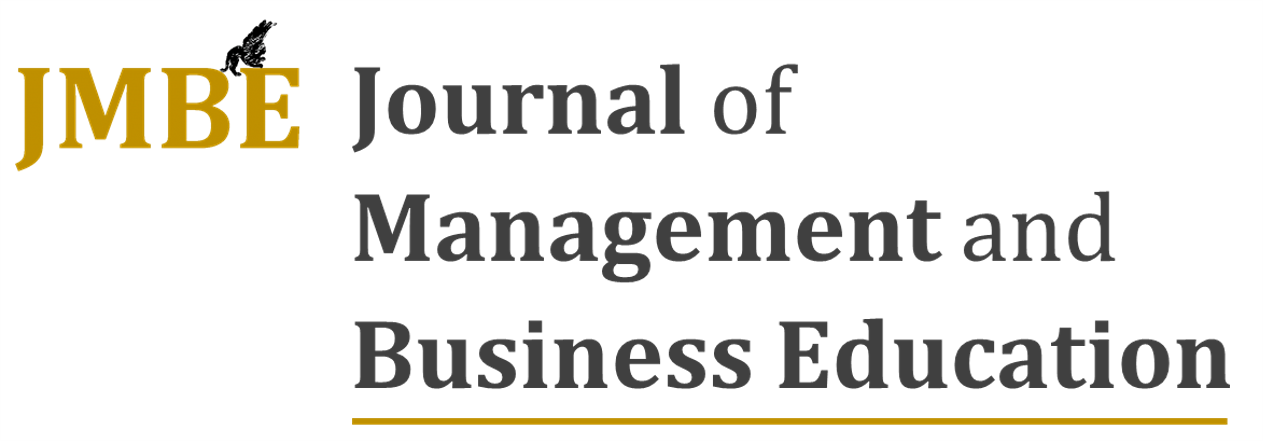The importance of research on higher education in business management
DOI:
https://doi.org/10.35564/jmbe.2018.0007Keywords:
Higher Education, teaching, learning, management, scientific method experience, motivationsAbstract
The editorial of this second issue of the Journal of Management and Business Education (JMBE) highlights the importance of contributing from the academy with scientific research on the educational process; both in general, and in particular in the specific field of higher education in business management. To do this, the impetus that the research on the learning teaching process, the Scholarship of Teaching and Learning (SoTL), and its dissemination through publications such as this one, the JMBE is showing in the current international academic landscape. The research related to the commitment of the university student, the Student Engagement, is also presented in all its dimensions; glimpsing topics of increasing interest in the same.
On the other hand, this editorial is the presentation of the content of the articles that make up the second issue of the magazine. Finalizing with thanks to all participants of the project that has come true.
Downloads
References
Aparicio, G.; Ruiz-Roqueñi, M. & Catalán, E. (2014). A model for implementing non-specific competencies (NSCs) in degree studies, defined using a Delphi study in Spanish universities. Sustainable Learning in Higher Education-Developing Competences for the Global Marketplace, SPRINGER, London, Chapter 4, 47-61.
https://doi.org/10.1007/978-3-319-10804-9_4
Aparicio, G.; Forcada, J.; Lafuente, A. & Zorrilla; P. (2015). Management challenges in Higher Education: New proposals from experiential marketing literature review. INTED 9th International Technology, Education and Development Conference, IATED, Madrid.
Asarta, C.; Fornaciari, C.J.; Arbaugh, J.B.; Bento, R.; Lund, D. & Hwang, A. (2017). Key institutions in business and management education research. Journal of Education for Business, 92, 220-229.
https://doi.org/10.1080/08832323.2017.1339660
Asarta, C.; Bento, R.; Fornaciari, C.J.; Lund, D.; Arbaugh, J.B. & Hwang, A, (2018). The Scholarship of Teaching and Learning: changing the dominant narrative about (and in) research institutions. Journal of Management Education.
https://doi.org/10.1177/1052562918777271
Beraza‐Garmendia, J.M. & Rodríguez‐Castellanos, A. (2015). Characteristics and effectiveness of university spin‐off support programmes, Academia Revista Latinoamericana de Administración, 28(1), 14-44.
https://doi.org/10.1108/ARLA-09-2013-0139
Catalán, E. & Aparicio, G. (2017). Interpretation of the Student Engagment paradigm in Spain. Revista Tecnología, Ciencia y Educación, 6, pp. 49-60
Diez-Martín, F. (2018). Donde estamos: Una introducción a la educación en los negocios. Journal of Management and Business Education, 1(1), 1-10.
https://doi.org/10.35564/jmbe.2018.0001
Johnson, M.K. & Dean, M. (2001). Student Engagement and International Baccalaureate: Measuring the Social, Emotional and Academic engagement of IB Students. Paper presented at the Annual Meeting of the American Educational Research Association. New Orleans, LA.
Kahu, E. R. (2013): "Framing Student Engagement in Higher Education", Studies in Higher Education, 38 (5), pp. 758-773.
https://doi.org/10.1080/03075079.2011.598505
Maseda, A.; Iturralde, T. & Aparicio, G. (2018). Mapping the intellectual structure of the student engagement field at universities. INTED2018 Proceeding (12th International Technology, Education and Development). IATED Academy, pp. 8745-8754.
https://doi.org/10.21125/inted.2018.2130
Rodríguez-Gulías, M.J.; Rodeiro-Pazos, D. & Fernández-López, S. (2017). The growth of university spin-offs: a dynamic panel data approach, Technology Analysis & Strategic Management, published online, DOI: 10.1080/09537325.2016.1277580.
https://doi.org/10.1080/09537325.2016.1277580
Salanova, M. & Schaufeli, W. (2009): "¿Qué es el engagement en el trabajo? concepto y medida", en El Engagement en el Trabajo: Cuando el trabajo se convierte en pasión, Alianza Editorial, Madrid, capitulo 3, pp. 93-125.
Stoeber, J., Childs, J.H., Hayward, JA. & Feast, AR. (2011). Passion and Motivation for Studying: Predicting Academic Engagement And Burnout In University Students. Educational Psychology 31 (4), 513-528.
https://doi.org/10.1080/01443410.2011.570251
Trowler, V. & Trowler, P. (2010): Student Engagement Evidence Summary, York, UK. Higher Education Academy.
Vrasidas, C. (2000). Constructivism versus objectivism: Implications for interaction, course design, and evaluation in distance education. International Journal of Educational Telecommunications, 6(4), 339-362.
Zanjani, N., Edwards, S. L., Nykvist, S., & Geva, S. (2016). LMS acceptance: The instructor role. The Asia-Pacific Education Researcher, 25(4), 519-526.
Downloads
Published
How to Cite
Issue
Section
License
Copyright (c) 2023 Journal of Management and Business Education

This work is licensed under a Creative Commons Attribution-NonCommercial-ShareAlike 4.0 International License.
License terms at: https://creativecommons.org/licenses/by-nc/4.0/legalcode




